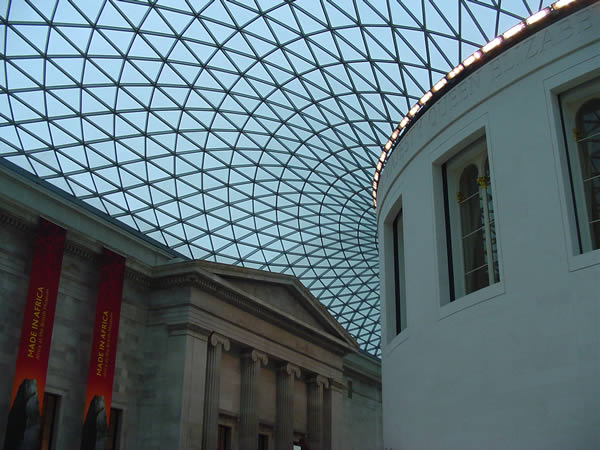This post is also available in:
![]() Deutsch
Deutsch
The British Museum is among the oldest public museums in the world and houses one of the world’s largest collections of the history of human cultures. The collection was started in 1753. The highlights of the museum include above all the famous Rosetta Stone, the Payava Tomb (Xanthos in Turkey), the Parthenon marble friezes, the remains of the Mausoleum of Halicarnassus, the Cylinder of Cyrus and the treasure of Sutton Hoo.
EGYPTIAN ART: THE ROSETTA STELE
The collection of Egyptian antiquities is particularly rich, consisting of statues, mummies and inscriptions. Among these the most famous is the Rosetta Stone, a stone with inscriptions from 2200 years ago. The stele was discovered in 1799 by Napoleonic troops who occupied Egypt and allowed archaeologists to decipher Egyptian hieroglyphics.
The inscriptions on the stone have the same text written in hieroglyphics, demotic and Greek. Thanks to this Jean Francois Champollion, a French Egyptologist, managed to decipher the texts in hieroglyphics and demotic comparing them with the text in Greek which was the only language of the inscription known at the time.
GREEK AND ROMAN ART
Also equally rich is the section of the museum dedicated to classical Greek and Roman antiquities with some remains of the Mausoleum of Halicarnassus and the Temple of Artemis in Ephesus, two of the seven wonders of the ancient world, in addition to the famous friezes of the Parthenon in Athens.
ASSYRIAN, SUMERIAN, BABYLONIAN AND PERSIAN ART
The Oriental Antiquities section of the British Museum houses the world’s most important collection of Assyrian, Sumerian and Babylonian art outside Iraq. But there are also numerous pieces of Persian art, such as the famous Cyrus cylinder, a cylindrical cuneiform inscription from 539 BC. dating back to the Persian conquest of Babylon.
ASIAN ART
Other sections of the museum are dedicated to Asian art, with rooms dedicated to China, Japan and Islamic art. Of great importance are the funeral items found in England in Sutton Hoo near Woodbridge, Suffolk, dating back to the 6th and 7th centuries AD.
PRINTS AND DRAWINGS
Finally, in the section dedicated to prints and drawings, there are mainly cartoons and drawings by Leonardo da Vinci, Raphael, Michelangelo, Dürer, Peter Paul Rubens, Rembrandt, Goya.
Tickets: Admission to the museum is free, you only pay entrance to special exhibitions.
How to get there: To reach the museum you can use the underground stations of Holborn, Tottenham Court Road, Russell Square, Goodge Street.
This post is also available in:
![]() Deutsch
Deutsch

